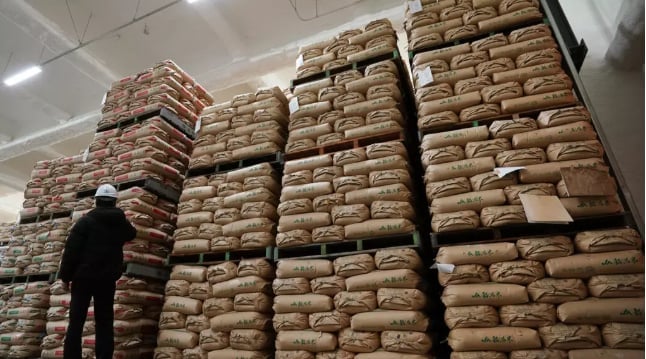November 27, 2025 | 20:51 GMT +7
November 27, 2025 | 20:51 GMT +7
Hotline: 0913.378.918
November 27, 2025 | 20:51 GMT +7
Hotline: 0913.378.918

The shortages have been driven by factors including poor harvests caused by hot weather and panic-buying prompted by a "megaquake" warning last year. Photo: Kazuhiro NOGI / AFP.
After rice prices nearly doubled year-on-year, the government began auctioning its stockpile last month -- the first time since it was started in 1995.
"In order to stabilise rice prices that have soared, the government will sell off its reserve rice every month until this summer" when newly harvested rice enters the market, agricultural minister Taku Eto said.
The shortages have been driven by factors including poor harvests due to hot weather in 2023 and panic-buying prompted by a "megaquake" warning last year.
Record numbers of tourists have also been blamed for a rise in consumption.
And some businesses are thought to be keeping their inventories and waiting for the most opportune time to sell.
The government has so far released around 210,000 tonnes of rice.
The next auction of 100,000 tons will take place in the week of April 21.
The retail price for five kilograms of rice in the last week of March was 4,206 yen ($29), up 104.5 percent year-on-year.
Japan is aiming to boost its rice exports almost eightfold to 350,000 tonnes by 2030, the government said last month.
Rice consumption in Japan has more than halved over the past 60 years as diets have changed to include more bread, noodles and other energy sources.
The new target is part of a long-term national policy to boost overseas rice shipments and make farming it more efficient as the country's ageing population shrinks.
Rice also appears to have been a factor in US President Donald Trump's hefty tariffs of 24 percent on Japanese imports into the United States.
The White House has accused Japan of imposing a 700-percent tariff on US rice imports, a claim that Eto was quoted as calling "incomprehensible".
(AFP)

(VAN) China’s cooking oil is suddenly flooding into India. It all comes down to a soybean surplus that Beijing doesn’t quite know what to do with.

(VAN) An Giang promotes supply-demand connections, standardizes quality and builds value chains, creating a foundation for sustainable bird’s nest development and aiming to expand exports.
/2025/11/24/5339-4-nongnghiep-075331.jpg)
(VAN) Recently, the conference on 'Sustainable Fisheries Linkage Chain - Tilapia for Export' took place in Tien Hai commune, Hung Yen province.
/2025/11/21/4309-2-153400_128.jpg)
(VAN) Green and low-emission rice is paving the way for Vietnamese rice to enter high-end markets, marking the beginning of a transformation journey toward greening and elevating the national rice brand.

(VAN) ‘Right to Win’ outlines a national action plan that shapes a new vision for Viet Nam’s agriculture in an era of renewal and global integration.

(VAN) Lam Dong’s farmed sturgeon output this year is expected to reach 2,300 tons, worth VND 450 billion, affirming the brand’s position on the market.

(VAN) A surge in Ukrainian egg exports, largely driven by soaring sales to the UK over the last few years, has notably pushed up egg prices on the domestic market.